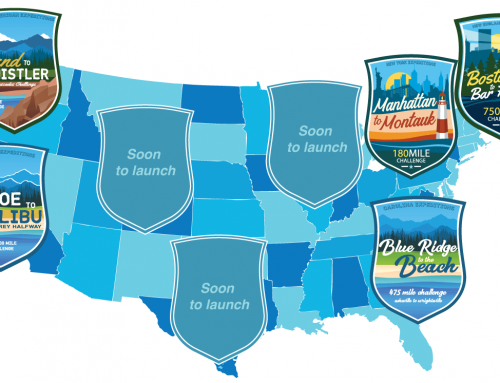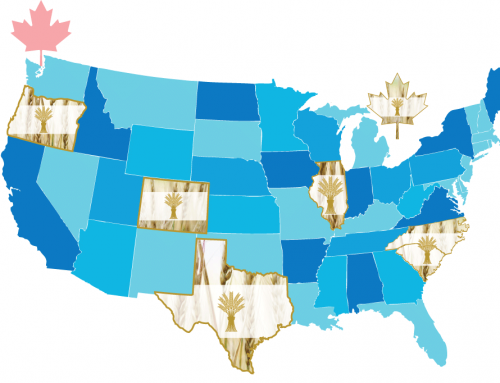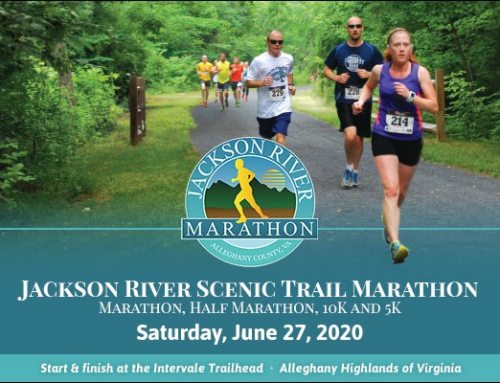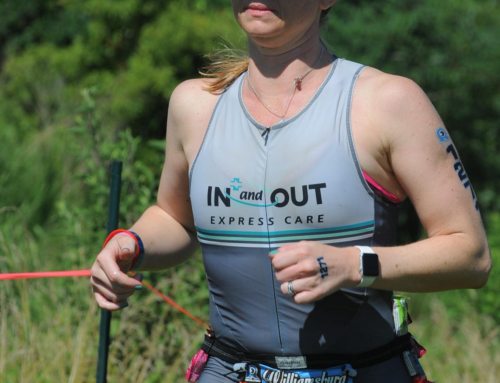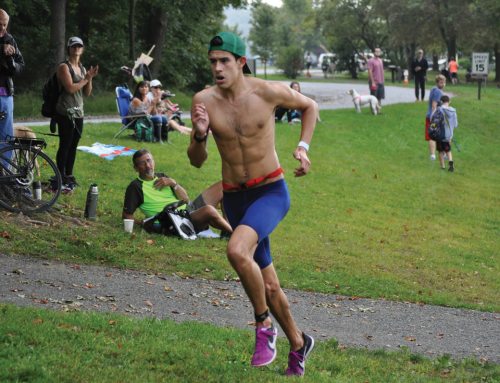
By Neil Jacobs
When the going gets tough, I think about when I was a kid, and I used to hang out in my dad’s fighter squadron office. He had this hand-drawn picture taped to the wall of a stork trying to swallow a frog, but the frog’s arm was reaching out from inside the mouth with a stranglehold on the bird’s neck. Below it read: “Never give up”.
When I look back on my years of racing, I have had it pretty easy. A few overuse injuries, colds, stress at work, etc., but other than the normal bumps in the road, I never had a story to tell – not like this one. The 2008 Ironman Florida was going to be the third time my dad and I have done that race together. Signing up the day after the ‘07 race, I filled out his online application as fast as I could to get us entered. When I got to the part of the entry form that asks, “What obstacles did you overcome to get here”, nothing came to mind, so I left it blank.
Early in the spring, after doing a few half iron events, my dad mentioned to me that he wasn’t recovering as fast as he was expecting to. I joked about him getting older, and said I thought he was probably just overtraining. After a few weeks of fatigue, I suggested he get his iron checked. When his hematocrit values registered almost single digits, the doctors issued a flurry of tests, which resulted in a diagnosis of leukemia – cancer of the blood.
Racing was the last thing on my mind, and I assumed it was the last thing on his mind. Who cares about racing; we need to tackle this cancer. I just assumed that an Ironman was out of the question, but every time I called home, he would tell me about how he was riding the trainer, and still planned on doing it. I just played along. Chemo is a real ass-kicker, and when he would lay in bed for 36 hours straight, I knew it was a pipe dream. Ironically, it is common practice to prescribe this (pipe) substance to combat chemotherapy side effects. However, like many cancer patients will tell you, there are good days and bad days, and when I would call the following day, he would be out running for 3 hours.
As the race date approached, I didn’t even want to race. My head wasn’t in it and for a race like an Ironman, which in my opinion is more mental than physical, it was already falling apart, and I hadn’t even picked up my packet. I had put in the miles, but it was a half-hearted effort to put a check in the daily workout box.
After arriving in Florida, I went through the motions of all the pre-race preparations with my dad, check in, drop off bike, etc. The entire time, there was no sign of doubt in his eyes. Was this confidence, or delusion? I know people say, “What the mind can believe, the body can achieve”, but there has to be some limit to this bounded by physical reality. I thought about going back to his entry form and writing his ordeal in the “overcome” section, but I was afraid it would be so over-the-top risky, that he might not be allowed to race, so I went back to my application, and changed my statement to “I’m pretty damn lucky”.
His oncologist knew he was planning on doing some “triathlons”. Thinking that the psychological boost of doing things you enjoy would outweigh any physical stress that this would add on the body, the doctor said OK. There is a big difference between a sprint distance triathlon and an Ironman, and my dad wasn’t about to make the distinction just as much as his doctor wasn’t about to assume the irrational.
The day before the race, I took his race numbers and wrote my cell phone and race number on the back along with a little note: “leukemia – low platelets – blood won’t clot – O+”. Then I laughed to myself recalling how my parents scoffed at BASE jumping and cage-diving with Great Whites. Man, this is a bad idea, but my dad won’t take advice from anyone. I should have just written: “when I want your opinion, I’ll give it to you” on the back.
Against the better judgment of everyone on the planet including his doctors, my dad walked down to the edge of the ocean. We had about 10 minutes before the start. I had considered bagging my goals, and just racing along side him, but he insisted I race my own race. I told him good luck, but luck really had nothing to do with it. For a split second, I pondered the worst scenario that could happen during a bike crash if your blood won’t clot. Then I realized, what is the point of living life if you don’t push the limits? The cannon fired, and there was no turning back.
I didn’t think much on the swim. I just went as hard as I could, and thought how nice it will be on the bike where I won’t be kicked and punched by 2,500 other people. The bike was a little windy, but otherwise, a typically day on that course – long, painfully flat rough roads, and boring as hell. Mile 80 to 90 on the bike is where I struggle mentally. The road surface is poor, and the false flat climb and headwind make it a real grind. I had taped two photos on my stem. One of my wife Jen, and one of my dad. I looked down at them a good bit during this stretch. I owed it to Jen to race hard. After all, she put up with my long hours of training. Then I looked at my dad’s photo, and thought about just how lucky I was to be here. I thought of all those people out there like him with huge mountains in life to climb. Most people seem to think that everyone else has it easier, but if you scratch the surface of their existence, you’ll find that they too have problems to overcome. – perhaps not the same as yours, but obstacles nonetheless. At that point, I came to the realization that if they had my luck, they’d be kicking my ass right about now.
The run is easier than the bike mentally. There are people everywhere, and the spectator support is amazing. Normally, I pass my dad on his first lap as I am headed into the finish. Prior to cancer, he was a solid 13-hour racer, which is pretty fast for someone in their sixties. As the miles ticked away, I was scanning the runners on their way out looking for him. I grew increasingly concerned as I entered the last 10k. Finally, with about 3 miles for me to go, I saw him jogging out. He was off the bike and looked strong, and with that relief in mind, I had a surge of power in my legs. I glanced at my watch for the first time during the entire run, and realized I was on my way to a new PR: 9:49:58. I had other things on my mind though.
I knew time and effort had to eventually take its toll on my dad. The other shoe was going to drop – hard. Anticipating the best-case scenario that he makes it to the run, I had OK’d it with the race director to go back out on the course. I quickly got a massage, ate four slices of pizza and a cheeseburger, put on a different pair of shoes, and ran back out on the course with my number, but no chip. Calling back to the hotel with my cell phone, I could get updates on his position from the internet.
It was dark and getting late. The course is an out-and-back, but somehow I got to the turnaround without finding him. Worried that he had blacked out in a port-a-john somewhere, I waved down one of the course officials who had a moped. Already knowing who I was and what I was doing, he said hop on, and we took off like Dumb & Dumber. We found my dad about 4 miles from the finish leaning on a parked car with a seized lower back. The race cutoff time is midnight, which gave us about 45 minutes to cover the final stretch. The sweepers had been following us with radios to update the finish line on our progress.
The crew at the finish line was fully aware of my dad’s situation by this time, and Mike Reilly had been hyping the crowd. Fearing the clock, I convinced him to speedwalk while holding my shoulder. It was dark, and the footing was sketchy. As we approached the final mile, we could hear the crowd at the finish line. All the excitement and commotion had brought out more and more people. Word spread quickly through the crowd – not a cancer survivor, but currently in a battle with it. Literally thousands of people, many in Halloween costumes, had come out to line the street. It was the loudest, craziest finish stretch I have ever seen. Like an Animal House keg party meets the converging crowd of the last 3 km of Alpe d’Huez, but in the dark with spot lights and camera flashes. When Mike Reilly, the race announcer, said, “Neil Jacobs, you are an Ironman”, it was the most deafening roar I have ever heard. He had done it – an Ironman triathlon in 16:54:33 with active leukemia.
I ended up running 38 miles that day, but that wasn’t shit compared to a guy with a hematocrit of 15, who didn’t really train because his chemotherapy treatments were getting in the way. I am almost embarrassed by how easy I have it. The burley bar in the Jacobs house had officially been raised to untouchable status. Then again, what should I have expected from a guy who got shot down in Vietnam, glided a flaming jet over the ocean before ejecting, and then spent the night treading water and kicking away sharks before being rescued by helicopter in the morning. He’s an Ironman; I knew that already. Quit is the only four-letter word in our house. There is no doubt in my mind that the frog won that battle.
# # #
Neil Jacobs spends most of his life trying to learn from his own mistakes. When he is not being a victim of circumstance, he spends his time at Cup-a-Joe fearing what the future holds. Neil is a competitive cyclist and distance runner who focuses mostly on the Iron distance triathlon. He has a PhD in atmospheric science and current works as a research scientist in RTP (Yes, he was forced to graduate and take a 9-to-5 job). In his free time, he teaches at Meredith College and watches Cartoon Network.


